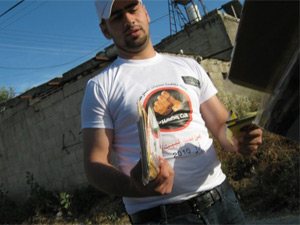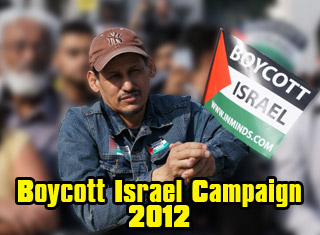
 Innovative Minds © 2014. All Rights Reserved. www.inminds.co.uk | ||||||||||||||
Palestinian boycott of Israeli settlement goods starts to biteHarriet Sherwood, The Guardian Campaign to clear supermarket shelves of West Bank settlement wares forces Israeli factories to cut production Israeli factories based in settlements on the West Bank have been forced to cut back production as a growing Palestinian boycott movement begins to take effect.
The West Bank market is worth around $200m (£133m) a year to Israeli businesses. But some settlement factories sell about 30% of their output to the Palestinian market, and the boycott is already having an impact on them.
The boycott, endorsed by the Palestinian president, Mahmoud Abbas, was given further momentum this week when a campaign to clear supermarket shelves of produce originating in settlements was rolled out in Ramallah. "The objective is to ensure the Palestinian market is free of Israeli settlement produce by the end of this year," the Palestinian prime minister, Salam Fayyad, said at the launch of the Store to Store campaign at the Alameen supermarket. A team of volunteers will inspect 66,000 stores across the West Bank in the coming weeks, awarding certificates and window stickers to those free of settlement produce. After a period of grace, shopkeepers retaining such produce in their stores could be liable to a fine of more than £9,000 or up to five years in prison under a law already passed but not yet enforced by the Palestinian legislative council. "This is the daily expression of rejection of the occupation," Fayyad said. "It will help ensure that the Palestinian economy is self-sufficient. There will not be a store in Palestine which cannot carry our stickers." The pro-boycott campaigners are careful to draw a distinction between produce from West Bank settlements, which are illegal under international law, and produce originating from within Israel. The latter will continue to be sold in Palestinian shops. The campaign has been attacked by Israeli politicians, businesses and commentators. "The Palestinians are opposing economic peace and are taking steps that in the end hurt themselves," the Israeli prime minister, Binyamin Netanyahu, said last month. The West Bank market is worth around $200m (£133m) a year to Israeli businesses. But some settlement factories sell about 30% of their output to the Palestinian market, and the boycott is already having an impact on them. Seventeen factories in Mishor Adumim, a large industrial estate between East Jerusalem and Jericho, have reportedly closed since the boycott campaign began. Some settlement factories are reported to be considering moving back into Israel.  Palestinian volunteer distributing boycott leaflets, T-Shirt reads 'Your conscience Your choice' Others in the Barkan industrial zone, near the settlement of Ariel, have reduced production, according to David Ha'ivri of the Shomron regional council, a pro-settler organisation in the northern West Bank. "Many of the factories are seeking alternative markets," he said. A factory producing aluminium window frames, which used to sell 30% of its output to the Palestinian market, had cut the hours of its 160 employees rather than lay people off, he said. More than half the 5,000-6,000 employees in the Barkan zone are Palestinian, employed under Israeli labour legislation and entitled to the Israeli minimum wage of around $1,000 a month[1] â considerably more than the average wage in the West Bank economy. "[The boycott] is an unwise act by the Palestinian Authority," said Ha'ivri. "The damage caused will be felt by both sides. They're cutting off the branch they're sitting on." The Palestinian Authority has established a $50m fund to provide alternative employment and grants in an effort to both discourage Palestinians from working in the settlements and foster the West Bank economy.
The Palestinian Authority said it was pleased with the level of support for the boycott, put in a recent survey at around 85%. Fayyad said it was "empowering the people" to resist the Israeli occupation without resorting to violence. "People feel national pride that they can participate in this campaign," a spokesman said.
According to the Manufacturers Association of Israel, some 22,000 Palestinians are employed by settlement businesses â in construction, agriculture, manufacturing and service industries. It is holding an extraordinary meeting this week to ascertain the impact of the boycott and consider what action to take. Dan Catarivas of the association said firms were more concerned about the withdrawal of Palestinian labour than the boycott of goods, although the impact was uneven. "These Israeli firms will have to find new workers â either Israelis or foreigners. But at the end of the day the Israeli companies will find other options, and the Palestinian workers will be left without jobs." He said the Israeli government had offered incentives to firms to establish factories in the West Bank, and it was possible that some of them may now seek compensation for their losses. The Palestinian Authority said it was pleased with the level of support for the boycott, put in a recent survey at around 85%. Fayyad said it was "empowering the people" to resist the Israeli occupation without resorting to violence. "People feel national pride that they can participate in this campaign," a spokesman said. The boycott is part of a wider attempt to foster non-violent resistance against Israel's occupation, including largely peaceful demonstrations against the separation barrier. Internationally, the boycott is gaining momentum. European Union guidelines urge supermarkets to clearly mark the origin of produce on labels to allow consumers to distinguish between Palestinian, Israeli and settlement produce. The Alameen supermarket owner, Erekat Ribhi Shukar, insisted Palestinian produce was competitive in terms of quality and price with settlement goods. "We should support Palestinian producers to help our economy," he said beneath a sign declaring "My conscience is clear â my store is clean of settlement produce". At the rear of the store, two young women shoppers examining a chiller cabinet containing Palestinian and Israeli dairy products but no settlement goods said they backed the campaign. "We want products that benefit our economy, not harm it," said one. Source: http://www.guardian.co.uk/world/2010/jun/29/palestinian-boycott-israeli-settlement-goods Comment: [1]They may be entitled to Israeli minimum wage but it doesn't mean they get it. Israeli labor rights organization Kav LaOved reports that the employment law, be it health and safety, conditions of employment or minimum wage, are openly flaunted in the settlements. For example the Royalife factory in the Barkan industrial zone are only paying a third of the minimum wage to the Palestinian women working there. Related ArticlesAlso Of InterestPage URL: http://www.inminds.co.uk/article.php?id=10436
|
|
Support Us
If you agree with our work then please support us.Campaigns INMINDS Facebook Live Feed Latest Video's
INMINDS Twitter Feed Tweets by @InmindsComFeatured Video's
You need Flash player 8+ and JavaScript enabled to view this video.
[all videos (over 200)..] Featured MP3 Podcast  "The United States is 4.6% of the worlds people but still controls 50% of the worlds wealth and has a military that spends more than every other country in the world combined. I see this moment, as a moment that is very dangerous.. which is to say that the United States is a declining world economic power, similarly a declining political power, but what isn't declining is the military power. As you know from the 20th century that's a dangerous combination - a declining economic and political power but an overwhelmingly dominant military power. I think the national security state that we've seen organised since 9-11 in an unbelievably rapid way, which owes in no small part to Israel I must say, is a particular [example]." A founding member of the Weather Underground Meeting with members of 'Smash EDO' in Tel Aviv, April 2010 [88min / 40Mb] [all podcasts..] Newsletter Feedback |
 |
 |






















































